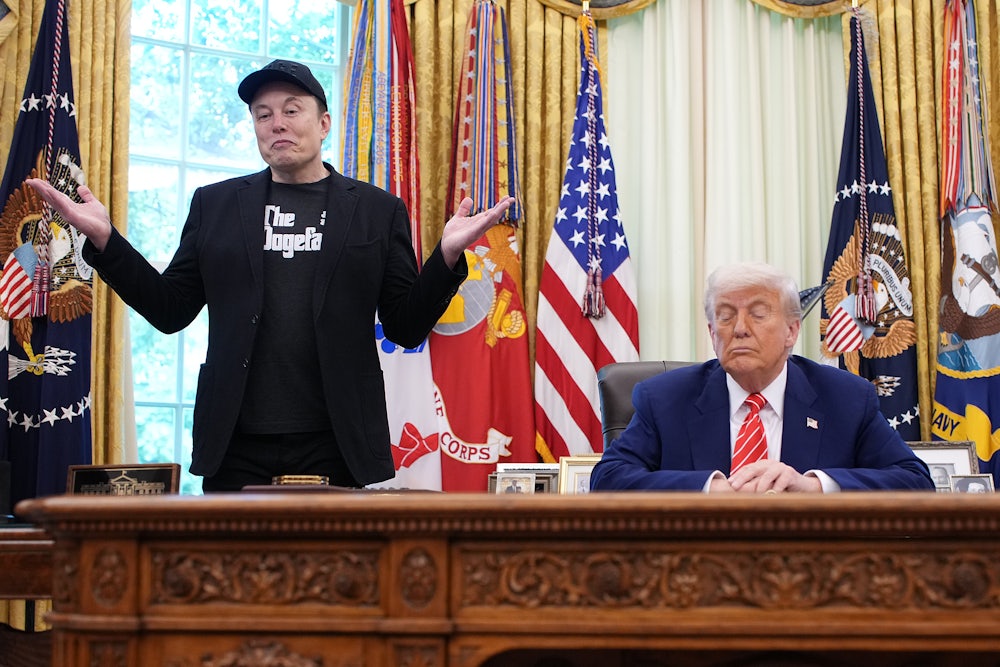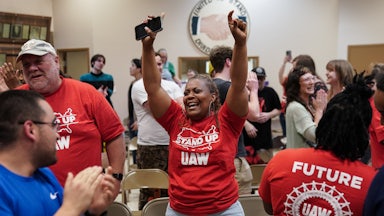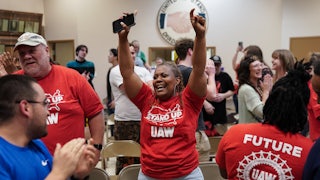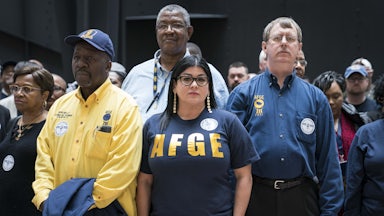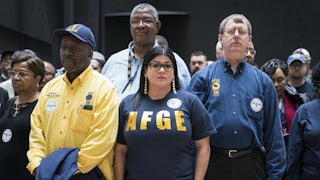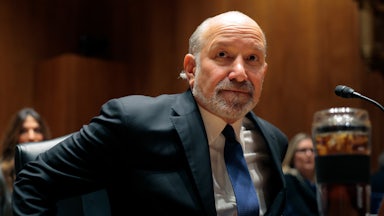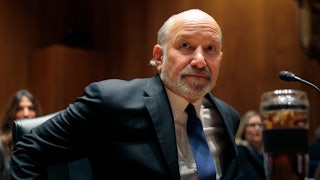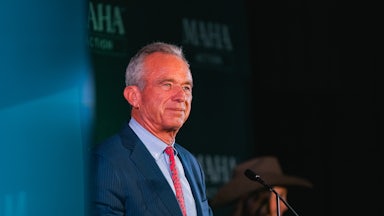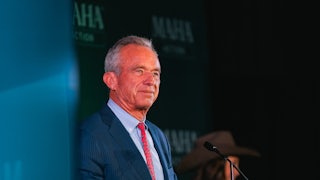It’s awkward every year to say “Happy Labor Day,” because the news about labor is almost never happy. Another trip around the sun brings another percentage drop in union membership. It’s now down to about 10 percent of workers, or half what it was four decades ago. (The historic peak was 34 percent in 1945.) Within the private sector, where union representation is needed most urgently, membership is below 6 percent. More people think Elvis is still alive, or that NASA faked the moon landings, than belong to a private-sector labor union.
“Happy Labor Day” sounds especially off-key this year because the National Labor Relations Board is on the ropes. The NLRB is the government agency that adjudicates private-sector disputes between labor and management. It oversees union elections and punishes labor law violations (excepting wage theft, which is policed by the Labor Department). Sustaining organized labor even at its severely depressed current level would be impossible without a functioning NLRB. But last week, the Fifth Circuit Court of Appeals ruled the NLRB’s 90 year-old structure unconstitutional, putting future enforcement of labor law very much in doubt.
As my New Republic colleague Matt Ford noted, the case on which the Fifth Circuit ruled is a Harper’s Weekly political cartoon that practically draws itself. Elon Musk, the richest human on Planet Earth, is chief executive and principal owner of Space X. Three years ago, eight workers there circulated internally a letter pointing out that Musk’s public behavior was “a frequent source of distraction and embarrassment for us” and urging the company to “uphold clear repercussions for all unacceptable behavior, whether from the CEO or an employee starting their first day.” The letter leaked to The Verge, and Space X fired nine signatories.
I won’t bother to document all the plainly unacceptable public behavior Musk engaged in at the time, because we’d be here all day. But the letter mentioned “recent allegations against our CEO and his public disparagement of the situation.” That referred to a Musk tweet making light of an episode in which Musk allegedly exposed his erect penis to a Space X contract flight attendant/masseuse and promised to buy her a horse if she’d give him a happy ending. Musk said the charges were “utterly untrue,” but Business Insider reported that after the flight attendant/masseuse brought sexual harassment charges, Space X paid her $250,000 to go away. Guilty or not, Musk did Space X no favors by joking publicly about the matter.
As I said, Space X fired nine signatories to the letter protesting Musk’s misbehavior. Eight of them filed charges with the NLRB, alleging illegal retaliation for concerted activity. “Concerted activity” is the legal term for any challenge to the terms and conditions of one’s employment, and it’s protected under the 1935 National Labor Relations Act, even for nonunion workers. Space X, you won’t be astonished to learn, is a non-union shop.
That Space X management’s retaliation constituted an illegal unfair labor practice was a slam dunk. An NLRB regional office gathered the charges together, filed a legal complaint against Space X, and scheduled an administrative law hearing on a case that the company was sure to lose. But before that hearing could occur, Musk sued the NLRB, arguing that the agency couldn’t investigate Space X because the NLRB itself was unconstitutional.
As I explained when Musk filed this lawsuit in January 2024, there’s a history here. Musk has tangled repeatedly with the NLRB, to a far greater degree than fellow oligarchs like, say, Jeff Bezos or Mark Zuckerberg. Most famously (before now) Musk threatened Tesla plant workers on Twitter with the loss of their stock options if they unionized. The NLRB ruled that move a labor violation, and when Musk appealed, even the reactionary Fifth Circuit had to agree (though it later vacated that ruling en banc).
Musk’s lawsuit against the NLRB recycled some arguments used successfully in the 2024 Supreme Court case SEC v. Jarkesy, in which a hedge fund manager whom the SEC busted for securities fraud was freed from paying a $300,000 fine on the grounds that the agency’s administrative law judges lacked constitutional authority to impose it. Musk, it turned out, helped bankroll the plaintiff in that case, along with the billionaire Mark Cuban. When people like me say that the United States is an oligarchy ruled by billionaires, this is the kind of thing we’re talking about.
Musk won the NLRB case too. Perhaps we’d save time going forward if regulators seek out Musk before finalizing any decision to ask whether it’s quite all right with his excellency.
The Fifth Circuit ruled that the National Labor Relations Act is unconstitutional because the president is barred by statute from firing at will the administrative law judges who decide NLRB cases brought by the agency’s 26 regional offices. A president can fire an NLRB administrative law judge only on the recommendation of the Merit Systems Protection Board, an independent agency that protects the rights of federal employees. The MSPB can recommend such a firing only “for good cause,” and only after the MSPB grants the administrative law judge in question an opportunity to defend himself or herself at a public hearing. MSPB members, the Fifth Circuit decision further complains, are themselves protected statutorily from at-will firings; a president may remove one “only for inefficiency, neglect of duty, or malfeasance in office.”
Granted, the Fifth Circuit said, an employer who feels wronged by an NLRB administrative law ruling can always appeal to the full board in Washington, D.C. But NLRB board members are hard to fire, too! The president may fire one only “for neglect of duty or malfeasance in office.” That hasn’t stopped Trump from firing Democratic NLRB board member Gwynne Wilcox as if she were employed at will (she’s not!), nor has it stopped the Supreme Court from letting him get away with it.
If our notional employer still feels wronged after the NLRB board rules against him, he or she can file an appeal in federal court. I half expected the Fifth Circuit judges to further complain that the president can’t fire federal judges (only Congress can remove them through impeachment), but they stopped short of condemning an independent judiciary as an intolerable infringement on presidential power.
Let’s clarify here that although it seems as though President Donald Trump is trying to fire every living federal employee, he is not, at the moment, trying to fire any administrative law judges at the NLRB. Neither was President Joe Biden when Musk first filed his suit. So why are the Fifth Circuit’s knickers in a twist about whether a president can fire an administrative law judge? Let’s further clarify that no administrative law judge has heard the Space X case, nor the two similar cases with which the Space X suit was joined, because all three companies won lower-court injunctions before such hearings could take place. So how exactly were these companies harmed? “When an agency’s structure violates the separation of powers, the harm is immediate,” the Fifth Circuit said, “and the remedy must be, too.” Apparently the NLRB has been harming all of us since Will Rogers’s small plane went down near Point Barrow, Alaska. Four generations failed to notice.
The ruling doesn’t shut down the NLRB entirely because it applies only to cases in Louisiana, Mississippi, and Texas, where the Fifth Circuit has jurisdiction. But Jennifer Abruzzo, who was President Joe Biden’s NLRB general counsel, told me that the decision will “open the floodgates for employers to forum-shop and seek to get injunctions” in those three states. Abruzzo added that the NLRB “should be appealing this, seeking a rehearing,” but it’s doubtful that it will.
Indeed, we should be grateful that the Trump NLRB contested Musk at all. Trump has no fondness for the NLRB; in firing Wilcox, he deprived the board of a quorum. In continuing to defend the NLRB after Biden left office, the Trumpies dropped the Biden NLRB’s arguments for statutory job protections, because Trump administration lawyers were arguing in other courtrooms against them. Instead, the Trump NLRB fought Musk half-heartedly on jurisdictional grounds that the Fifth Circuit rejected. It also essentially asked the court, pretty please don’t use this decision to strike down every previous decision issued by an NLRB administrative law judge since a pint-sized Shirley Temple was Hollywood’s top box-office draw. The Fifth Circuit said it will address this “severability” question at some future date.
In a sane world, we could rest confident that the Fifth Circuit’s attempt to repeal the New Deal would be reversed by the Supreme Court. But there’s every reason to believe that the Supreme Court will uphold it, because it, too, is trying to repeal the New Deal. It’s especially hostile to job protections at independent agencies, and indeed I believe it will eventually chuck these even at the Federal Reserve, which it’s tried vaguely to shield from Trump’s power grabs. When the Fed loses its independence, that will be a bad day for the oligarchs. But this Labor Day they can toast the NLRB’s imminent destruction.
